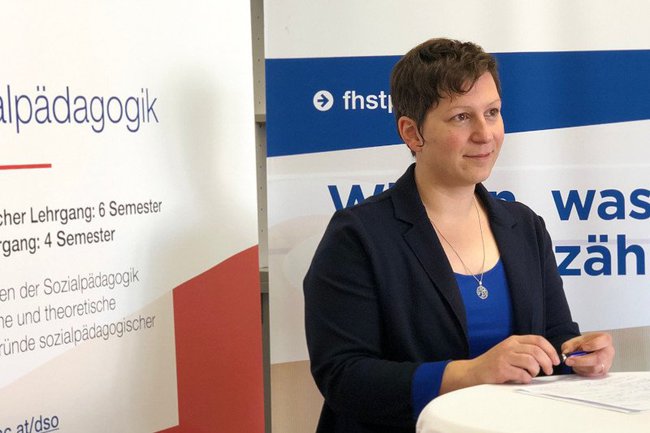Social Pedagogy Symposium 2020
An Online Event on the Topic of "System crashers – a cry for help?!"

On 19 November, the Social Pedagogy Symposium was held online. This joint event of the St. Pölten UAS and the Sozialpädagogisches Betreuungszentrum Schauboden (SBZ Schauboden) was dedicated to the possibilities, opportunities and challenges in working with children and adolescents in the field of social pedagogy.
Adjusted Kinds of Care
Time and time again, educational and care facilities are forced to come to terms with the fact that certain systems are obviously not appropriate for all children and adolescents, which results in dire consequences and massive problems in working and living together, culminating in the discontinuation of care relationships and in exclusion.
The affected persons are often referred to as “Drehtür-Klient*innen” (revolving door clients, as they enter, leave and re-enter so many institutions) or “Systemsprenger*innen” (system crashers). This year’s Social Pedagogy Symposium was devoted to discussing how to deal with this topic, and how adequate care for children and adolescents can be ensured in the most reliable way.
“The challenges and resources highlighted by these children and teenagers can be crucial for the further development of offers and structures. The goal is to guarantee the young people’s well-being in all its facets”, says Christine Schmid, head of the further education programme Social Pedagogy at the St. Pölten UAS.
“We at the SBZ Schauboden often experience situations where certain children and adolescents reveal the limits of our care methods in social pedagogy residential communities. It is our daily challenge to come up with new and creative, tailor-made forms of care that enable the positive development of these young people. To ensure high-quality care, the professional exchange with colleagues from our own as well as other disciplines is indispensable”, explains Sabine Sommerer, director of the SBZ Schauboden.
Catering to Adolescents who Reject Help
One keynote of the event was held by Wolfgang Hagleitner from the Institute of Educational Sciences at the University of Innsbruck on the topic of “Systemsprenger*innen – Symptomträger der Kinder- und Jugendhilfe?” (System crashers – symptoms carriers of child and youth welfare?). He raised the questions of which effects the system of child and youth welfare has on the behaviour of children and adolescents. To do this, Hagleitner presented results of a study carried out by SOS Kinderdorf and Pro Juventute on young people’s ages of entry and exit as well as the duration of their stay in permanent educational assistance facilities. Based on this information, Hagleitner deducts possible consequences of these developments for social pedagogy work and the system of chid and youth welfare.
Beate Huter and Michael Nesler from SOS Kinderdorf Vorarlberg held the second keynote titled “Was es braucht, damit wir hilfreich sein können. Kreative Settings und mentalisierende Haltung in der Arbeit mit Teams und komplexen professionellen Netzwerken rund um schwer zu erreichende Kinder und Jugendliche“ (What it takes for us to be helpful. Creative settings and mentalising attitude in working with teams and complex professional networks to care for hard-to-reach children and adolescents).
They illustrated the major challenges faced by professionals, teams and organisations in working with clients that are hard to reach. For example, Huter and Nesler showed how public- and private-sector child and youth welfare can create variable, creative and individual frameworks to reach adolescents who have rejected help, and how their needs can be met.
Practice, Research, Exchange
In addition to this professional input, the Symposium also provided the opportunity to exchange views on this topic and establish contacts in this future field of research. Among other things, the launch of a teaching/research project was announced: until 2022, 26 students of the further education master degree programme Social Pedagogy are going to conduct research on topics such as national and international best practice examples, dealing with extreme situations in social pedagogical everyday life, and innovative ideas and instruments related to this phenomenon.
More than 300 participants took part in the Social Pedagogy Symposium, among them different professional groups, representatives of practical institutions, social pedagogy initiatives, various educational facilities and decision-makers, and funding bodies. In this way, the symposium is not only an opportunity for dialogue but also fulfills an important exchange and networking function on this topic.
The results of the symposiums shall be discussed at a follow-up event in 2022.
Social Pedagogy Symposium 2020
„Systemsprenger*innen“ – Ein Hilfeschrei?! Chancen, Möglichkeiten und Herausforderungen
(System crashers – a cry for help?! Possibilities, opportunities and challenges)
